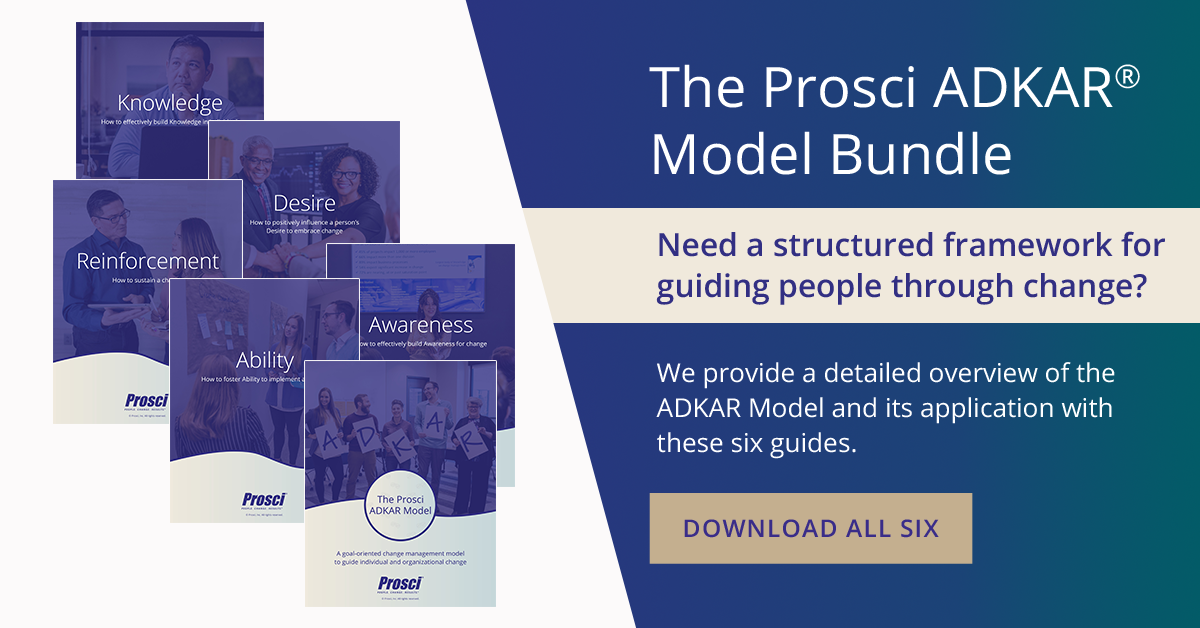The ADKAR Model: Undercut Ability, Undercut Your Change

2 Mins
Updated: July 12, 2022
Published: June 21, 2016

In the Prosci ADKAR Model, knowledge and ability are two distinct elements. Knowledge of how to do something does not automatically translate into being able to do it. For example, I played one season of softball at age six. My coaches taught me how to bat: proper knee bend, elbow placement, and timing. I understood it because I was capable of learning the concepts of batting. Yet when I had to actually go to bat in a game, all that knowledge would fall away. I would panic and my batting attempts resembled laborious golf swings and rarely made contact. (Needless to say my first softball season was my last.)
The Knowledge-Ability Gap
In times of change we cannot assume that if a person can grasp new concepts they will be able to enact new behaviors. We need to plan specifically for how to build ability based on knowledge. And ability is critical because it is where the change is realized. Just imparting knowledge of how to change doesn’t actually bring about change; people acting in a new way (demonstrating ability) is when the change is realized. If you undercut ability, you undercut the entire change.
We can foster ability by providing hands-on instruction, one-on-one coaching, and access to subject matter experts. Even with tactics in place to grow ability, you may run into some bumps in the road. Here are a few of the most common barriers to ability, and what you can do about them:
Psychological Blocks
Sometimes, the only thing that stands between knowledge and ability is our own thinking. This is what happened to me in softball. My panic clouded my thinking and I couldn’t remember all of the learning from practice.
During a change, someone may have a mental block around what they’re trying to do. This may be the result of anxiety, fear, or self-doubt. If someone is running into a psychological block, the best thing we can do for them is take time to understand what they’re up against, without judgment. They may need a safe space to practice where no one is watching, encouragement of their skills and coaching to overcome this barrier.
Limited Time To Develop New Skills
The reality in my softball story is that I only gave it one season. Who knows, if I had given it more time, I could have been the next A-Rod (but probably not). However, many people can perform new skills and make the leap from knowledge to ability if they have enough time.
In today’s just-in-time environment, it is rare that we provide employees with enough time to build ability before a system goes live or a new process is expected to be executed with high proficiency. In your planning, consider the time employees need to both learn what to do and practice new skills before they are expected to perform in a live environment.
Existing Habits
We are physiologically wired for habit, and the development of new skills and habits requires the development of new neural pathways. This means we are hard-wired to revert to our old ways of doing things. The more ingrained our old habits, the more risk to developing ability. Fighting these old habits can become very frustrating and reduce previously felt awareness of the need for the change and desire to participate in the change.
In these cases, you may need to repeat messaging on awareness and desire to encourage someone to continue to do the work required to build new skills and habits. Also, understanding that people are wired to revert to old habits impacts how we approach fostering ability; we must respect the pull of old habits and have patience as people work to build new ones.
What It Means For You
First, keep in mind there is a difference between knowledge and ability, and plan accordingly. Think of your training plan as an “ability-building plan” and consider the time and activities needed for both knowledge and skill development. As you help others build ability, it is inevitable that people will run into one of the above, or other, snags. Take the time to understand people’s unique ability barriers and address them. Since ability is where a change really comes to life, taking action around ability could be what ultimately allows your change to be a success.


